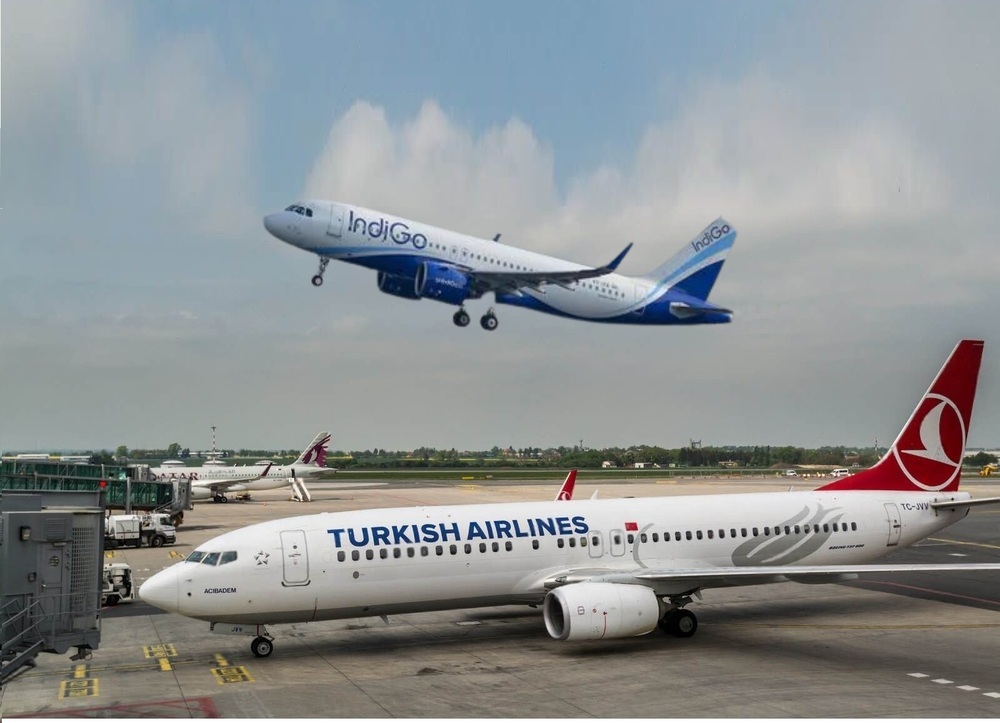
- India has denied Turkish Airlines’ request to increase flight frequency to India, and it remains capped at 28 weekly flights for Turkish carriers under the bilateral agreement.
- Due to security concerns, India’s aviation authorities, under the direction of the Ministry of Civil Aviation and the DGCA, have also increased their scrutiny of Turkish airline investments in 2025.
- These restrictions come as a major blow to the Turkish aviation industry as they lose out on a huge market share in India and also disrupt Istanbul as a key transit hub for many Indian passengers.
- Restrictions on Turkish Airlines will benefit Indian carriers on long-haul international routes and strengthen Mumbai and Delhi as hubs.
The relations between India and Turkey have suffered a major blow recently. This follows the India-Pakistan military flare-up that took place during May 2025, following the dastardly terrorist attack in Pahalgam, and during which Turkey publicly supported Pakistan. This led to outrage amongst the Indian people, who called for the immediate suspension of business and aviation ties with Turkey.
Citing security and commercial concerns, Air India also urged the government to revoke IndiGo’s lease agreement with Turkish Airlines. With regard to this, India’s aviation regulator (DGCA) only approved a brief, final extension for IndiGo’s lease of Turkish aircraft. The government, too, has repealed the security clearance for the Turkish ground handling firm, Celebi, at the Indian airports.
India has taken a firm stance in regulating access to its sky to Turkey. Firstly, India has denied Turkish Airlines’ request to increase flight frequency to India. It remains capped at 28 weekly flights for Turkish carriers under the bilateral agreement. In order to shield Indian airlines on international routes and avoid indirect competition, India denied Turkish carriers the Fifth Freedom rights via Istanbul. Moreover, in order to prevent its hubs, such as Delhi and Mumbai, from serving as feeder routes to Istanbul, India denied Turkish Airlines expanded rights.
The Government of India, along with the Ministry of Civil Aviation and its regulatory body, the Directorate General of Civil Aviation (DGCA), has also paused the expansion of the bilateral air services agreement with Turkey. Due to security concerns, India’s aviation authorities, under the direction of the Ministry of Civil Aviation and the DGCA, have also increased their scrutiny of Turkish airline investments in 2025.
Impact on Airlines and Aviation Operations
India’s tightening of restrictions on Turkish Airlines has significantly impacted the airline’s operations. India has prohibited Turkish Airlines from increasing the number of flights to Indian cities. Air India has also reconsidered aircraft maintenance contracts with Turkish Technic due to the Turkish support for Pakistan during the India-Pakistan tensions.
Due to the revoked security clearances, Turkish ground handling companies cannot operate at Indian airports, severely restricting their business in India. IndiGo has transitioned its international collaboration from Turkish Airlines to European and American-based companies, including Air France-KLM and Delta. The reduced passenger connectivity through Istanbul has considerably impacted the transit options for travellers from India to Europe or the Americas.
These restrictions come as a major blow to the Turkish aviation industry as they lose out on a huge market share in India. However, at the same time, this benefits Indian carriers on long-haul international routes and strengthens Mumbai and Delhi as hubs. These measures also disrupt Istanbul as a key transit hub for many Indian passengers and encourage direct international connectivity. This move comes to benefit European and U.S. carriers, showcasing a shift in alliances.
Impact on Relations
India is more likely to maintain a careful stance with regard to expanding aviation ties with Turkey during the ongoing geopolitical tensions. Any future cooperation will be subject to Turkey’s alignment and mutual agreements. While Indian carriers are focusing on more direct international routes and shifting reliance to other nations, the Government of India is prioritising strategic partnerships with other nation-states.
References:
- https://www.reuters.com/world/india/india-extends-indigos-turkish-airlines-lease-by-just-three-months-2025-05-30/
- https://indianexpress.com/article/business/aviation/turkish-airlines-partnership-indigo-ceo-indian-government-10020385/?utm_source=chatgpt.com
- https://www.ft.com/content/24d4cb4b-0081-437d-9fe1-28f0f84aa013?utm_source=chatgpt.com
- https://economictimes.indiatimes.com/industry/transportation/airlines-/-aviation/indigo-ceo-responds-to-dgca-deadline-to-end-turkish-lease-says-it-will-help-in-finding-solution-for-customers/articleshow/121550319.cms?utm_source=chatgpt.com&from=mdr
Archita Gaur is a postgraduate student at the School of International Studies, JNU. She specialises in the World Economy and has a strong interest in public policy, economic research, and governance. The views expressed are the author’s own.
